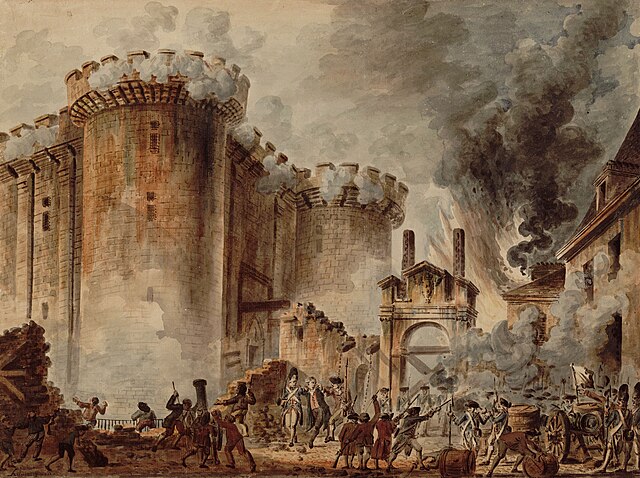Causes of the French Revolution
There is significant disagreement among historians of the French Revolution as to its causes. Usually, they acknowledge the presence of several interlinked factors, but vary in the weight they attribute to each one. These factors include cultural changes, normally associated with the Enlightenment; social change and financial and economic difficulties; and the political actions of the involved parties. For centuries, the French society was divided into three estates or orders.The first estate, the highest class, consisted of clergy.
The second estate consisted of the nobility.
The third estate consisted of the commoners. It included businessman, merchants, court officials, lawyers, peasants, landless labourers and servants.
Storming of the Bastille
Depiction of a Lit de justice at the Parlement of Paris in 1450.
The 17th-century French playwright Molière (1622–73) catalogued the social-climbing essence of the bourgeoisie[citation needed] in Le Bourgeois gentilhomme (1670)
1822 depiction of the 1596 Assembly of Notables in Rouen
The French Revolution was a period of political and societal change in France that began with the Estates General of 1789, and ended with the coup of 18 Brumaire in November 1799 and the formation of the French Consulate. Many of its ideas are considered fundamental principles of liberal democracy, while its values and institutions remain central to modern French political discourse.
The Storming of the Bastille, 14 July 1789
Caricature of the Third Estate carrying the First Estate (clergy) and the Second Estate (nobility) on its back
Le Serment du Jeu de paume by Jacques-Louis David (c. 1791), depicting the Tennis Court Oath
The Storming of the Bastille on 14 July 1789; the iconic event of the Revolution, still commemorated each year as Bastille Day



![The 17th-century French playwright Molière (1622–73) catalogued the social-climbing essence of the bourgeoisie[citation needed] in Le Bourgeois gentil](https://upload.wikimedia.org/wikipedia/commons/thumb/f/fe/Moli%C3%A8re_-_Nicolas_Mignard_%281658%29.jpg/480px-Moli%C3%A8re_-_Nicolas_Mignard_%281658%29.jpg)



